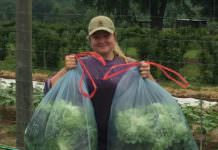by guest blogger Robin Hoy, Bucks County Foodshed Alliance
 Spring is here, with joyous signs of new life around Bucks County. Part of our annual Spring welcome is enjoying the classic symbol of new life – the egg. Candy eggs are one thing, but selecting eggs to dye for Easter and eat the rest of the year can be a conundrum. Cage-free, brown, white, free-range, organic or just plain cheap? Here’s a key to the differences.
Spring is here, with joyous signs of new life around Bucks County. Part of our annual Spring welcome is enjoying the classic symbol of new life – the egg. Candy eggs are one thing, but selecting eggs to dye for Easter and eat the rest of the year can be a conundrum. Cage-free, brown, white, free-range, organic or just plain cheap? Here’s a key to the differences.
Many believe brown eggs are better nutritionally, but an egg’s nutritional value is determined by the food the hen eats, not the color of the shell.
More than 90 percent of the eggs sold in the U.S. are from “battery hens” housed in stacks of cages holding 4 to 6 hens, each hen with less than a notebook paper-sized space. The hens are de-beaked and given prophylactic antibiotics that contribute to antibiotic resistance – theirs and ours. Their feed is genetically engineered corn and soybeans, with animal by-products and nutritional supplements added.
“Cage-free” eggs are from hens living in buildings holding thousands – no cages but with little more space. If not “certified organic,” the hen’s diet is no different from those in cages and their eggs no different nutritionally.
“Certified organic” eggs are from hens fed certified organic feed and no antibiotics. Organic feed has less pesticide residue and no genetically engineered ingredients. Even if not in cages and required to have access to the outdoors, in reality hens providing “free-range” and organic eggs are rarely outside.
The real difference in quality of life for the hen and nutritional content of her eggs comes when hens are raised with access to living, growing greens, insects, worms and grubs. Chickens are omnivores, NOT vegetarians. According to numerous studies, these lucky girls’ eggs are much higher in omega-3s, cancer-fighting carotenes, vitamins A, D and E, and are lower in cholesterol than battery-raised hens.
While eggs from pasture-raised hens are largely unavailable at local grocers, the good news is that farmers are raising them in Bucks County and selling them at farmers’ markets here. Just ask your farmer where her hens spend their days. It makes all the difference. Look for the deep orange yolks – the telltale sign of happy hens foraging in fresh air on rich, diverse pasture.
To find out where you can buy eggs from pasture-raised chickens, go to our list of local farmers’ markets. Birchwood Farms (Wrightstown/Newtown) and Milk House Farm Market (Newtown) also sell their eggs from pasture-raised hens at their onsite farm markets.










![What we’re reading [Oct 16 2017]](https://www.buckscountytaste.com/wp-content/uploads/2017/10/coffee_macbook_reading_pexels-photo-414630-218x150.jpeg)

Why locally farmed, pastured eggs are tops http://t.co/xbDpWNbmrz
Liz Hobba liked this on Facebook.
Jo Ann Mitidieri Long liked this on Facebook.
Oh – and what about the Happy Farm in Upper Black Eddy? 🙂